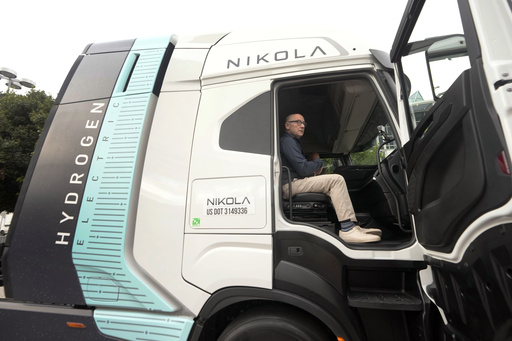Nikola Corp., the troubled manufacturer of electric vehicles, has recently initiated Chapter 11 bankruptcy proceedings, a move that comes after warnings that the company would likely deplete its cash reserves early this year.
Once celebrated as a promising start-up and a favorite among investors, Nikola’s reputation significantly declined due to a series of scandals, culminating in the conviction of its founder, Trevor Milton, in 2022. Investors were misled regarding the technological capabilities of the Arizona-based company, which ultimately led to serious consequences for Milton.
During Milton’s trial, prosecutors revealed that a promotional video, which showcased a prototype truck cruising down a desert road, was misleading. In reality, the footage depicted a stationary truck that had been rolled down a hill rather than one genuinely operational.
The company once enjoyed a staggering valuation of approximately $30 billion in 2020, surpassing that of Ford Motor Co. However, despite the initial hype, Nikola struggled to grow its operations primarily focused on electric trucks. In the last quarter, the company managed to produce 83 trucks but suffered a net loss approaching $200 million. This was a decline from the second quarter’s output of 77 trucks, which also resulted in a significant financial loss of nearly $134 million.
Nikola’s bankruptcy filing took place in the District of Delaware, where the company also expressed intentions to pursue an auction and sale of its assets. Currently, Nikola has around $47 million in liquid cash.
The firm has indicated plans to maintain limited service and operational support for existing vehicles, including refueling services, until the end of March, contingent on court approval. They mentioned the need for further funding to sustain these activities post-deadline.
In a statement, CEO Steve Girsky pointed out that, similar to other players in the electric vehicle sector, Nikola has encountered numerous market and economic challenges that hindered its operations. He noted that while the company has been actively working to raise additional funds and manage liabilities, those measures have proved insufficient.
“The Board has concluded that Chapter 11 offers the most viable path forward given the current circumstances,” Girsky stated, highlighting the complexity of the company’s situation.
Earlier in December 2023, Milton received a four-year prison sentence after being found guilty of inflating claims regarding his company’s capability to manufacture zero-emission 18-wheel vehicles, resulting in significant financial harm to investors. Described as a con artist by prosecutors, Milton had established Nikola in a basement in Utah six years before his conviction.
It was also claimed during the trial that Milton had misrepresented the production of revolutionary trucks, which were, in fact, rebranded products from General Motors sporting Nikola’s insignia. As a government witness, Nikola’s CEO disclosed that Milton was known for exaggerating the potential of his venture to potential stakeholders.
Milton stepped down from his position in 2020 amidst allegations of fraud, which subsequently caused Nikola’s stock to plummet. Investors experienced steep losses as doubts arose concerning Milton’s assertions regarding the company’s production capabilities.
In 2021, Nikola reached a settlement of $125 million with the SEC regarding a civil lawsuit but did not admit to any wrongdoing.
In addition to personal scandals, Nikola faced an increasingly challenging landscape for electric vehicle manufacturers, as sales began to decline. Former President Donald Trump has expressed intentions to dismantle what he inaccurately refers to as President Joe Biden’s “electric vehicle mandate.” This would entail revoking a non-binding objective set by Biden aiming for electric vehicles to constitute half of all new car sales by 2030, alongside likely efforts to eliminate the $7,500 tax credit for new electric vehicle purchases established by the 2022 climate legislation, the Inflation Reduction Act.
Nikola shares, which are located in Phoenix, Arizona, fell below the $2 mark late last year and dropped an additional 40% recently.




